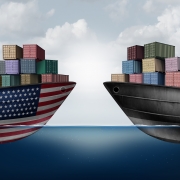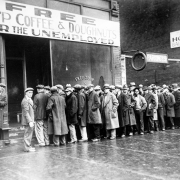Why The Great Depression Still Matters So Much Today
Why worry about an event that occurred almost a century ago? Because history left unexamined is doomed to repeat itself. And sometimes even then, history still repeats itself. “What is past is prologue,” the old saying goes, but it doesn’t have to be that way.
I have previously spent some time taking a closer look at the root causes of the Great Depression, which are widely misunderstood. While mainstream economists will often attribute the crash of 1929 to unbridled capitalism, quite the opposite is true. Government intervention both caused and prolonged the economic crisis, leaving many Americans financially ruined.
But by understanding the root causes of a historical crisis as severe as the Great Depression, we stand a better chance at recognizing the potential for similar events to occur today. And if we know what warning signs to look for, we also stand a better chance at preventing future economic crises from occurring altogether.
In fact, there are two modern examples that perfectly demonstrate the importance of heeding history’s warnings: the housing crisis of 2008 and Trump’s recent trade wars.
The Housing Crisis
The 2008 housing crisis, had many similarities to the Great Depression. But unfortunately, many mainstream economists failed to recognize the warnings signs. Had they been paying closer attention, we may have been able to avoid, or at the very least lessen the impact of, the Great Recession.
Like the Great Depression, the housing crisis has many contributing factors. But both are perfect examples of the Austrian business cycle in action. Just like the Great Depression, prior to 2008, the government had meddled with the monetary supply, artificially lowering interest rates and increasing credit, making it accessible to more people.
This resulted in many people making the decision to purchase a home, and why wouldn’t they? In the short-term, this seemed like a smart idea since interest rates were so low. For a manageable monthly payment, they could own a brand new home, which is more than many thought they would ever be able to afford. But they failed to realize that the low rates were only temporary. Eventually, the regular rates would go back into effect, significantly increasing monthly mortgage payments.
But with each new home loan approved, the housing bubble grew even larger, until eventually, it popped. With new homeowners unable to make their monthly payments, many were left with no option but to foreclose. And with so many people defaulting on their home loans all at once, the bubble burst and the Great Recession was born.
If the elected officials and mainstream economists in 2008 would have paid attention to the Austrian business cycle, they would have recognized what was about to happen. And to be sure, there were many Austrian economists who warned of the coming crash. They were, however, laughed at and dismissed as crazy by the media and other economists.
Tariffs and Trade Wars
Unlike the housing crisis, Trump’s trade wars can still be stopped before they do any further damage, if those in power make the right decisions. Over the last several months, economists from all camps have warned Trump that tariffs on foreign imports would spell disaster for the American economy. The president has been an advocate for protectionist policies, that he believes will boost the American economy by forcing consumers to “buy American,” thus creating more jobs domestically.
But tariffs do not serve to benefit anyone and our economy will most certainly be in extreme trouble if we engage in any actions that bring us closer to a full-blown trade war, as the Great Depression taught us.
In fact, economists have likened the new tariffs to the infamous Smoot-Hawley Tariff, which, as discussed previously, exacerbated the downfall of the economy in the earlier days of the Great Depression by increasing the rates of unemployment. We already know how that story ended, so one can only hope that Trump Administration proceeds with caution lest we end up in a similar position.
The new tariffs, which will focus on Chinese imports, has not gone into effect yet, which means there is still time for President Trump to change his mind. Hopefully, he studies history before engaging in a trade war that could cost many Americans jobs.






